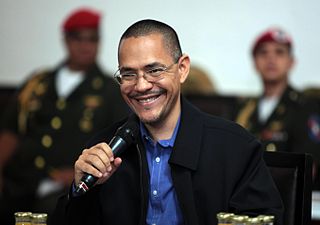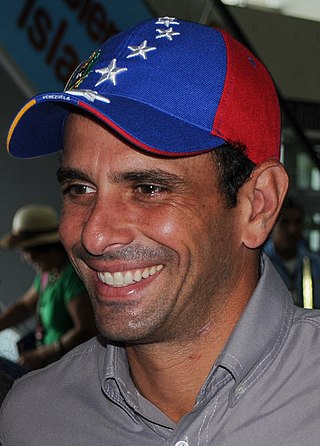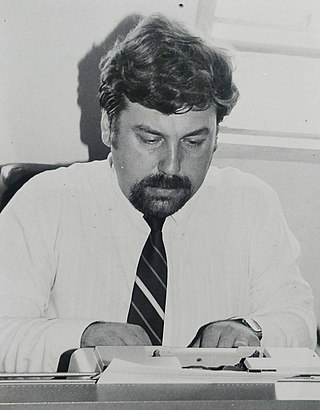Mass media in Venezuela comprise the mass and niche news and information communications infrastructure of Venezuela. Thus, the media of Venezuela consist of several different types of communications media: television, radio, newspapers, magazines, cinema, and Internet-based news outlets and websites. Venezuela also has a strong music industry and arts scene.

Telesur is a Latin American terrestrial and satellite news television network headquartered in Caracas, Venezuela and sponsored by the governments of Venezuela, Cuba and Nicaragua.

The Revolution Will Not Be Televised, also known as Chávez: Inside the Coup, is a 2003 Irish documentary film. It focuses on events in Venezuela leading up to and during the April 2002 coup d'état attempt, which saw President Hugo Chávez removed from office for two days. With particular emphasis on the role played by Venezuela's private media, the film examines several key incidents: the protest march and subsequent violence that provided the impetus for Chávez's ousting; the opposition's formation of an interim government headed by business leader Pedro Carmona; and the Carmona administration's collapse, which paved the way for Chávez's return. The Revolution Will Not Be Televised was directed by Irish filmmakers Kim Bartley and Donnacha Ó Briain. Given direct access to Chávez, the filmmakers intended to make a fly-on-the-wall biography of the president. They spent seven months filming in Venezuela, following Chávez and his staff and interviewing ordinary citizens. As the coup unfolded on 11 April, Bartley and Ó Briain filmed on the streets of the capital, Caracas, capturing footage of protesters and the erupting violence. Later, they filmed many of the political upheavals inside Miraflores, the presidential palace.

Corporación Venezolana de Televisión or VTV is a state-run television station based in Caracas, Venezuela, which can be seen throughout the capital and surrounding areas on channel 8. Programs that can be seen on VTV included Aló Presidente and Telesur Noticias.

Radio Caracas Televisión (RCTV) was a Venezuelan free-to-air television network headquartered in the Caracas neighborhood of Quinta Crespo. It was sometimes referred to as the Canal de Bárcenas. Owned by Empresas 1BC, Radio Caracas Televisión (RCTV) was inaugurated on 15 November 1953 by William H. Phelps, Jr. Its radio counterpart was Radio Caracas Radio.

Globovisión is a 24-hour television news network. It broadcasts over-the-air in Caracas, Aragua, Carabobo and Zulia on UHF channel 33. Globovisión is seen in the rest of Venezuela on cable or satellite and worldwide from their website. Some of Globovisión's programs can be seen in the United States on cable network Canal Sur and TV Venezuela, a channel offered in DirecTV's Para Todos package. In Latin America, Globovision can be seen in Argentina, Colombia, Chile, Ecuador, Peru, Uruguay and other territories as Aruba, Trinidad and Tobago, Barbados and Curaçao in DirecTV's package.

Manuel Antonio Rosales Guerrero is a Venezuelan educator and politician, current governor of Zulia. He was the most prominent opposition candidate in the 2006 presidential election, losing to incumbent Hugo Chávez. He served as a congressman, mayor, and governor, but in April 2009, stepped down as Mayor of Maracaibo when he was charged with corruption in Venezuela and fled to Peru. Rosales denies the charges, and was granted political asylum in Peru.
Últimas Noticias is a tabloid newspaper in Venezuela founded in 1941 after pro-freedom measures implemented by President Isaías Medina Angarita and was the largest circulated newspaper in Venezuela prior to 2014. It historically had a center-left stance and was initially friendlier to the Hugo Chávez administration. The newspaper became more critical of chavismo in the late 2000s and early 2010s. After it was bought in 2013 by British financier Robert Hanson, its editorial line became less critical of the government.

The Simón Bolívar Symphony Orchestra of Venezuela is a Venezuelan orchestra. Named after the Venezuelan national hero Simón Bolívar, it was initially the apex of the nation's system of youth orchestras. By 2011, it was no longer officially a youth orchestra as many of its members remained with the orchestra and the average age had risen to the early 20's. It was replaced as the national youth orchestra by the Teresa Carreño Youth Orchestra.
Nelson Bocaranda Sardi is a Venezuelan television commentator, columnist, investigative journalist, and founder of the Runrunes website. He has received several awards for his work, including the 1985 National Journalism Award.

Jesse Alonso Chacón Escamillo is a Venezuelan politician, engineer, and former military officer. Chacón participated in the November 1992 coup attempt the second attempted coup of that year, when he took part in the occupation of the station of the state television station channel Venezolana de Televisión (VTV), where several workers of the station were killed. Two years after the coup, he was pardoned by president Rafael Caldera. During Hugo Chávez's tenure, he served in many high ranking positions, such as minister of communications, minister of interior and justice and minister of electric power.

Presidential elections were held in Venezuela on 7 October 2012 to choose a president for a six-year term beginning in January 2013.

Presidential elections were held in Venezuela on 14 April 2013 following the death of President Hugo Chávez on 5 March 2013. Nicolás Maduro—who had assumed the role of acting president since Chávez's death—was declared winner with a narrow victory over his opponent Henrique Capriles, the Governor of Miranda. Capriles had run in the previous election less than a year before, losing to Chávez by an 11-point margin. This time the margin of victory was much smaller, and thus became the closest presidential election of the country since the 1968 election.

Vladimir Villegas Poljak is a Venezuelan journalist and politician. He was President of Venezolana de Televisión from late 2003 to December 2004. He has written regularly for El Nacional and El Mundo, with a weekly column in El Nacional. He is a founder of the Avanzada Progresista party, having previously been a supporter of Patria Para Todos.

Ernesto Emilio Villegas Poljak is a journalist, politician, and writer from Venezuela.

The primary elections of the Unity Roundtable were held on February 12, 2012, and determined the presidential candidate of the Democratic Unity Roundtable (MUD) for the 2012 Venezuelan presidential election, which were held on October 7, As well as their candidates in the coming regional and municipal elections, to be held in December 2012 and December 2013 respectively. These were the first open presidential primaries in the history of Venezuela, and the largest of its kind and in participation in world history.
Marta Colomina Reyero is a Spanish-Venezuelan journalist and retired college professor. For two decades she taught journalism in her alma mater, the University of Zulia. During the 1980s she was president of the Venezuelan state television channel, Venezolana de Televisión, and held a column of opinion in the newspaper El Universal for almost twenty years. Since 2014, she has written for the newspaper El Nacional.

Ibéyise Pacheco is a Venezuelan journalist and writer, specializing in investigative journalism, who has been linked with politics due to her opposition to the governments of Hugo Chávez and Nicolás Maduro.

Alberto Rafael Garrido García was an Argentine–Venezuelan journalist, political analyst and writer known for his works on Hugo Chávez. The focus of a better part of his career, his extensive knowledge on Chávez led Venezuelan media to dub him a "Chavólogo".
Germania Rodríguez Poleo is a Venezuelan journalist. Germania has been a correspondent for The Independent in Miami, in addition to collaborating with media such as Caracas Chronicles, CNN and Daily Mail.















